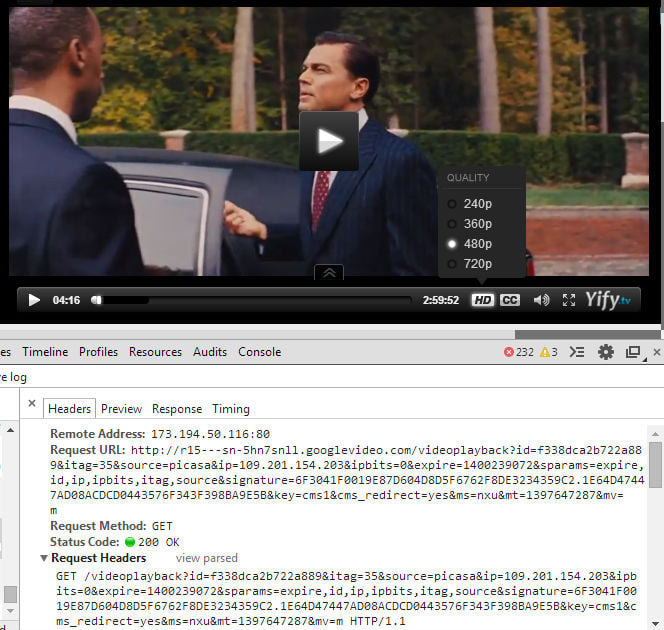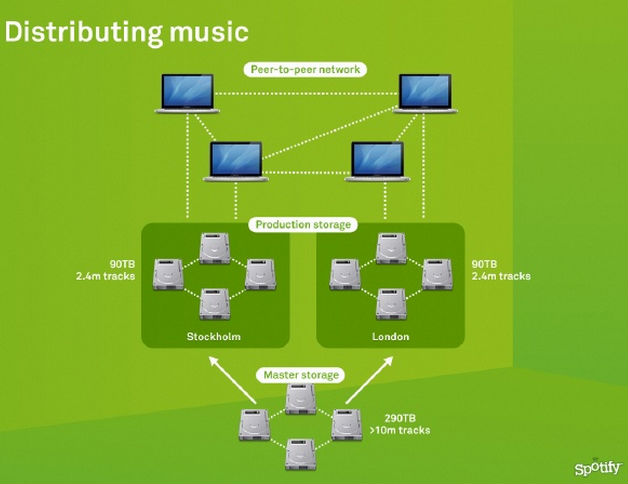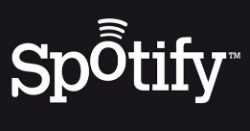TorrentFreak Email Update |
| Pirate Video Streaming Sites Exploit Google’s Servers Posted: 17 Apr 2014 02:55 AM PDT
However, there is another less visible problem that cropped up in recent months. Increasingly, streaming portals with a focus on the latest pirated copies and TV-shows are using Google as a source. A German anti-piracy outfit has identified more than 18,000 pirated videos that are featured on more than a dozen large sites. All these streaming sites use the same movie sources without charge, and the bandwidth bill goes to Google. The list of sites includes Movie4k.to, hdmoviezone.net, viooc.co, viooz.be, viooz.cc, vioozmovies.me, watch32.com, putlocker.bz, putocker.to, putlocker.tw, megashare.info, megashare.sh, megashare.ca, afdah.com, yify.tv, watch32.com. Together these streaming portals are good for several million daily visitors, which means that Google must be seeing a lot of traffic originating from these sites. The screenshot below shows a copy of The Wolf of Wall Street on YIFY.tv, available in several video qualities and with subtitles if needed.  It’s unclear where the videos are hosted, but the URL above shows the googlevideo.com domain. In addition, it includes a “source=picasa” string, suggesting Google’s image hosting service has something to do with it. While the site owners are benefiting from the free storage, copyright holders are less excited. A German media outfit, which remains unnamed, reportedly sent requests to Google last month hoping to take down the files, but without success. Since the files remain online, the lawyers of the media company have now applied for an injunction against Google at a local court. Two weeks ago Warner Bros. also asked Google to remove several of these URLs from its search engine. These requests were denied, most likely because the videos can’t be accessed directly through the link Warner provided. In a comment to TorrentFreak, Google stresses that users are not permitted to distribute copyrighted content without permission. The company is actively trying to stop these kinds of abuses and also responds swiftly to takedown notices. “Use of Google platforms to host infringing materials is a violation of our terms of use, and we design features into our systems to make them unattractive for this kind of abuse,” a Google spokesperson told TF. “We also respond quickly to disable access to any materials on our platforms identified to us by copyright owners as infringing,” Google adds. Why the thousands of Google-hosted videos on these streaming portals remain online is unclear. It could be that Google indeed removed the files in question, but that they were re-uploaded. Another possibility is that the copyright holder didn’t correctly identify the source file, as Warner Bros’ takedown notice suggests. One of the additional problems copyright holders face is that the URLs of the videos are harder to identify. Automated takedown tools can’t easily spot where the files are coming from, which makes it more complicated to send takedown requests. It will be interesting to see how this issue will be dealt with in the future. It’s clear that neither Google not the copyright holders are happy with the current situation. For now, the only ones benefiting are the streaming portals and their millions of users. Source: TorrentFreak, for the latest info on copyright, file-sharing and anonymous VPN services. |
| Spotify Starts Shutting Down Its Massive P2P Network Posted: 16 Apr 2014 11:33 AM PDT
With the option to stream millions of tracks supported by an occasional ad, or free of ads for a small subscription fee, Spotify appeared to be a serious competitor to music piracy. In the years that followed Spotify conquered the hearts and minds of many music fans. Currently available in 61 countries, the service has amassed dozens of millions of users. A true success story, one that was in part made possible due to Spotify’s heavy reliance on P2P technology. In fact, Spotify has long been one of the largest P2P networks on the Internet. When Spotify subscribers play a track in the desktop client, this could come from three sources: a cached file on the computer, one of Spotify’s servers, or from other subscribers through P2P. In 2011 we reported that of all tracks that were not accessed over the Internet, roughly 80% went through the P2P network. This allowed Spotify to reduced server resources and associated costs, which is a pretty big deal for a startup. However, the end of the road is coming soon for this massive private sharing network. TorrentFreak has learned that Spotify plans to discontinue its P2P technology altogether, to rely solely on central servers instead. “We’re gradually phasing out the use of our desktop P2P technology which has helped our users enjoy their music both speedily and seamlessly,” Spotify’s Alison Bonny informs TF. Where Spotify previously needed P2P to guarantee that all tracks could be played with the lowest lag possible, this is no longer needed. During the months to come Spotify will effectively shut down its P2P servers. “We’re now at a stage where we can power music delivery through our growing number of servers and ensure our users continue to receive a best-in-class service,” Bonny says. P2P has been central to Spotify’s success for a variety of reasons. For one, it allowed the service to scale up quickly without having to invest heavily in servers and bandwidth. This must have saved the company millions of dollars per year. Also, one of the lead engineers since the start is none other than Ludvig Strigeus, the original creator of the BitTorrent client uTorrent. Strigeus sold uTorrent to BitTorrent Inc. in 2006, and some believe that part of this money went into the development of Spotify. Spotify’s departure from P2P technology marks the end of an era, but to most people the change will simply go unnoticed, just like the fact that they have been sharing tracks with thousands of people from all over the world for years, with permission from the major record labels.  Source: TorrentFreak, for the latest info on copyright, file-sharing and anonymous VPN services. |
| You are subscribed to email updates from TorrentFreak To stop receiving these emails, you may unsubscribe now. | Email delivery powered by Google |
| Google Inc., 20 West Kinzie, Chicago IL USA 60610 | |
 Google has been in the crosshairs of the entertainment industries for a while now. These companies believe that Google is
Google has been in the crosshairs of the entertainment industries for a while now. These companies believe that Google is 